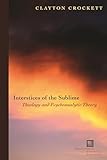Interstices of the Sublime : Theology and Psychoanalytic Theory / Clayton Crockett.
Material type: TextSeries: Perspectives in Continental PhilosophyPublisher: New York, NY : Fordham University Press, [2022]Copyright date: ©2007Description: 1 online resource (232 p.)Content type:
TextSeries: Perspectives in Continental PhilosophyPublisher: New York, NY : Fordham University Press, [2022]Copyright date: ©2007Description: 1 online resource (232 p.)Content type: - 9780823227228
- 9780823291830
- online - DeGruyter
| Item type | Current library | Call number | URL | Status | Notes | Barcode | |
|---|---|---|---|---|---|---|---|
 eBook
eBook
|
Biblioteca "Angelicum" Pont. Univ. S.Tommaso d'Aquino Nuvola online | online - DeGruyter (Browse shelf(Opens below)) | Online access | Not for loan (Accesso limitato) | Accesso per gli utenti autorizzati / Access for authorized users | (dgr)9780823291830 |
Browsing Biblioteca "Angelicum" Pont. Univ. S.Tommaso d'Aquino shelves, Shelving location: Nuvola online Close shelf browser (Hides shelf browser)

|

|

|

|

|

|

|
||
| online - DeGruyter In the Name of Italy : Nation, Family, and Patriotism in a Fascist Court / | online - DeGruyter In the World, Yet Not of the World : Social and Global Initiatives of Ecumenical Patriarch Bartholomew / | online - DeGruyter Interpreting Excess : Jean-Luc Marion, Saturated Phenomena, and Hermeneutics / | online - DeGruyter Interstices of the Sublime : Theology and Psychoanalytic Theory / | online - DeGruyter Intimacy and Italian Migration : Gender and Domestic Lives in a Mobile World / | online - DeGruyter Into Disaster : Chronicles of Intellectual Life, 1941 / | online - DeGruyter Intrigues : From Being to the Other / |
Frontmatter -- Contents -- Acknowledgments -- Introduction -- 1. On Sublimation -- 2. We Are All Mad -- 3. Desiring the Thing -- 4. Foreclosing God -- 5. Anxiety and the S(ub)lime Body of God -- 6. Ages of the World and Creation ex Nihilo, Part I -- 7. Ages of the World and Creation ex Nihilo, Part II -- 8. God Without Being (God) -- 9. Expressing the Real -- 10. Processing the Real -- Conclusion -- Notes -- Index -- Perspectives in Continental Philosophy Series
restricted access online access with authorization star
http://purl.org/coar/access_right/c_16ec
Interstices of the Sublime represents a powerful theological engagement with psychoanalytic theory in Freud, Lacan, Kristeva and Zizek, as well as major expressions of contemporary Continental philosophy, including Deleuze, Derrida, Marion, and Badiou. Through creative and constructive psycho-theological readings of topics such as sublimation, schizophrenia, God, and creation ex nihilo, this book contributes to a new form of radical theological thinking that is deeply involved in the world. Here the idea of the Kantian sublime is read into Freud and Lacan, and compared with sublimation. The sublime refers to a conflict of the Kantian faculties of reason and imagination, and involves the attempt to represent what is intrinsically unrepresentable. Sublimation, by contrast, involves the expression and partial satisfaction of primal desires in culturally acceptable terms. The sublime is negatively expressed in sublimation, because it is both the "source" of sublimation as well as that which resists being sublimated. That is, the Freudian sublime is related to the process of sublimation, but it also distorts or disrupts sublimation, and invokes what Lacan calls the Real. The effects of the sublime are not just psychoanalytic but, importantly, theological, because the sublime is the main form that "God" takes in the modern world. A radical postmodern theology attends to the workings of the sublime in our thinking and living, and provides resources to understand the complexity of reality. This book is one of the first sustained theological readings of Lacan in English.
Mode of access: Internet via World Wide Web.
In English.
Description based on online resource; title from PDF title page (publisher's Web site, viewed 03. Jan 2023)


